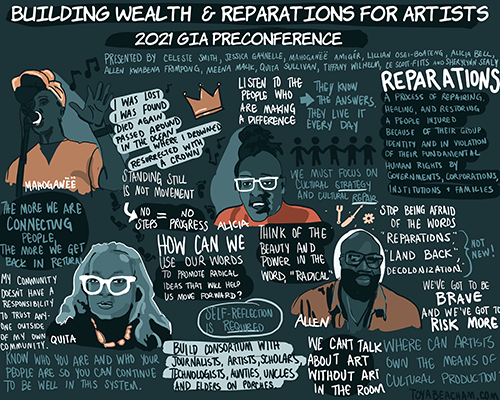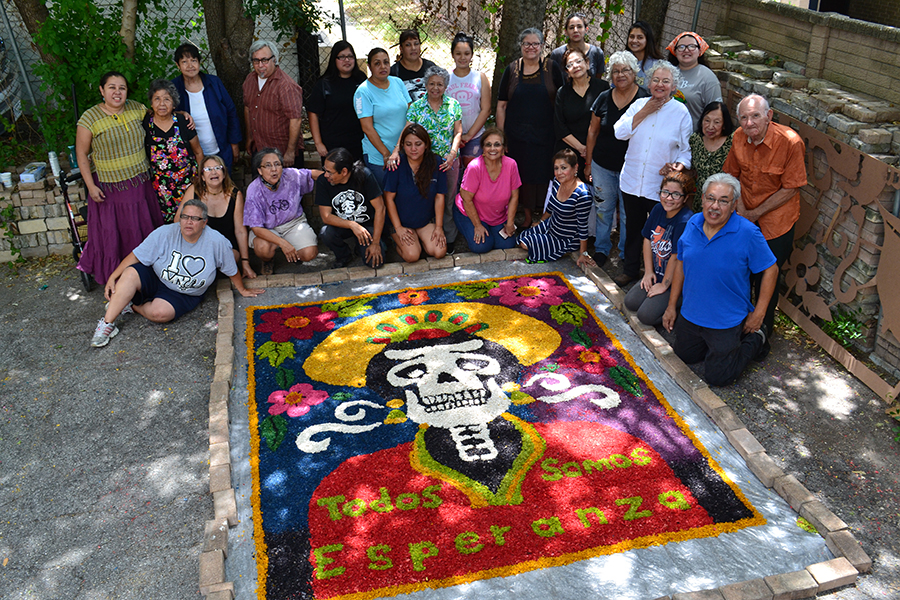Join us for the Disability Justice for Individual Artists: Cap, SNAP, Solution Webinar
Tuesday, May 31 at 11am PDT | 2PM EDT
Our latest webinar on disability justice offered a well-rounded discussion on best practices when funding and supporting artists with disabilities. As the sector continues to develop and pivot towards transformational change, we were reminded that our work must be “guided by those most impacted by systems of oppression”. But we know that change can only be as transformational as policy and federal law will allow.
Learn more and register here.
Our latest webinar on disability justice offered a well-rounded discussion on best practices when funding and supporting artists with disabilities. As the sector continues to develop and pivot towards transformational change, we were reminded that our work must be “guided by those most impacted by systems of oppression”. But we know that change can only be as transformational as policy and federal law will allow.
Learn more and register here.
Building Wealth and Reparations for Artists
Relive the 2021 GIA Conference through artist and graphic recorder, Toya Beacham, artistic piece, which captures the essence of the Building Wealth and Reparations for Artists preconference. Participants discussed reparations, the funder response to debts that are owed to artists, and how to leverage this power to be a mover and shaker in the field of philanthropy. Read more about the day’s discussions here.
This Week in the Future of the Field Series
“A 'thriving' community doesn’t mean that residents never have difficulties. It means that any difficulties are accompanied by access to well-being: relationships, support, engagement.” Read GIA’s latest #FutureoftheField reflection, “From Absence to Presence: Arts and Culture Help Us Redefine 'Health'” from Tasha Golden, International Arts + Mind Lab at Johns Hopkins University School of Medicine and Center for Arts in Medicine at University of Florida.
From Animating Democracy: Aesthetic Perspectives in Grantmaking Webinar
Tuesday, April 19 at 1pm PDT | 4pm EDT
Since its release in 2017, funders, Local and State Arts agencies, and arts and cultural organizations have tapped the framework, Aesthetic Perspectives: Attributes of Excellence in Arts for Change, to support their grantmaking and evaluation. Developed by artists with ally evaluators and funders to address aesthetic and cultural biases and Eurocentric standards of excellence, Aesthetic Perspectives offers 11 attributes to guide the development, implementation, and evaluation of creative practices and products in arts for change work. This ARtsU webinar offers ways the framework can be activated in the cycle of grantmaking. The Kentucky Foundation for Women shares how it has integrated the framework to guide grantee reporting and the foundation’s own learning. Offered by Animating Democracy/Americans for the Arts. Free. Register here.
Since its release in 2017, funders, Local and State Arts agencies, and arts and cultural organizations have tapped the framework, Aesthetic Perspectives: Attributes of Excellence in Arts for Change, to support their grantmaking and evaluation. Developed by artists with ally evaluators and funders to address aesthetic and cultural biases and Eurocentric standards of excellence, Aesthetic Perspectives offers 11 attributes to guide the development, implementation, and evaluation of creative practices and products in arts for change work. This ARtsU webinar offers ways the framework can be activated in the cycle of grantmaking. The Kentucky Foundation for Women shares how it has integrated the framework to guide grantee reporting and the foundation’s own learning. Offered by Animating Democracy/Americans for the Arts. Free. Register here.
Image courtesy Esperanza Buena Gente.

Launched in 2015, Common Field - a national network of independent visual arts organizations and organizers that connects, supports, and advocates for the artist-centered field - announced that, “after a comprehensive auditing and strategic visioning process in 2021, Common Field has made the decision to begin an intentional sunsetting process and will close as an organization in December 2022”…
From National Endowment for the Arts: "We invite you to join us in sending the below letter to the Interior, Environment, and Related Agencies Appropriations Subcommittee in support of funding for the National Endowment for the Arts (NEA)."…
"Yesterday, the National Endowment for the Arts joined more than 90 federal agencies in releasing its Equity Action Plan to the public, and shared the plan with stakeholders and partners."…
“Virginia G. Piper Charitable Trust’s nearly $141 million in grantmaking during the last half of 2021 is a keen expression of both its legacy of long-term strategic investment in Maricopa County’s (AZ) resilience and its unique ability to respond powerfully to unfolding crises,” announced in the Business Wire…
The Barr Foundation seeks a Learning and Evaluation Consultant to support the newly launched cohort, Powering Cultural Futures, a new six-year initiative that provides funding, technical assistance, peer networking, and other supports to a diverse cohort of 15 BIPOC-rooted organizations in Massachusetts…


